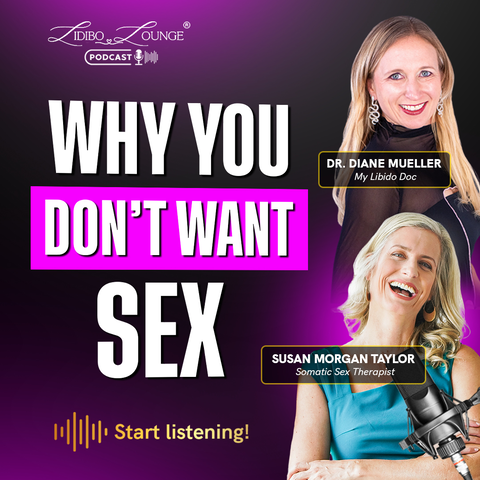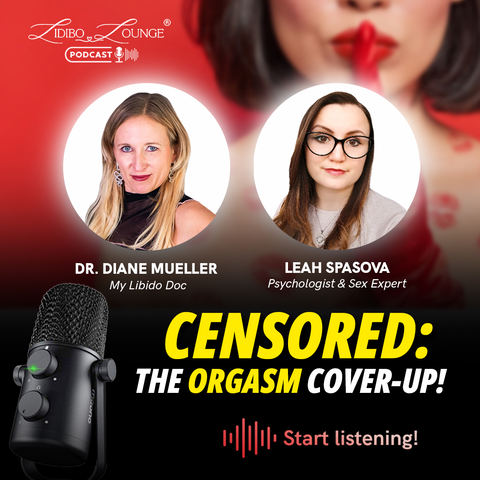Let’s talk about a topic that isn’t discussed very often… signs and symptoms of menopause (besides hot flashes).
Menopause is a natural stage in a woman’s life. It is when the body stops reproducing. We don’t talk about it a lot. A lot of women know very little until they hit menopause themselves. So, let’s talk about menopause and the signs and symptoms of it. We will also give you great advice on how to manage your menopause
From Perimenopause to Postmenopause: The Menopausal Journey
Menopause is three distinct stages: peri-menopause, menopause, and post-menopause.
Peri-menopause: This is a primary time where signs and symptoms of menopause appear. The menstrual cycle starts to become irregular due to the hormonal changes and you’ll have months where you don’t ovulate.
Menopause: This is one point in time, defined as a 12-month period without menstruation. You can have it confirmed by your doctor with an FSH test, which should be 30mIU/ml or higher.
Post-menopause: This is the time after menopause when a woman hasn’t had a period for over a year. So, you will no longer have periods but some women do continue to experience symptoms of menopause.
What happens during Menopause?
In menopause, the ovaries stop producing hormones. Estrogen and progesterone levels start to fluctuate and trend down. Most of the symptoms of menopause are due to the resulting low estrogen.
On the one hand, hurrah no more periods! But on the other hand, menopause brings a whole host of other interesting challenges.
Some women have severe signs and symptoms of menopause and some have absolutely none! The majority of women fall somewhere in the middle. It is an extremely individual experience for each different woman.
The Physical Signs and Symptoms of Menopause
- Hot flashes and night sweats: Changes in estrogen and progesterone can cause changes in body temperature that make you feel too hot. To cool down, the body responds with a hot flash. This can happen during the night as night sweats. We wrote a blog on hot flashes here (LINK TO RECENT BLOG ON HOT FLASHES) where we talk about what they are and how you can manage them better.
- Vaginal dryness and discomfort during intercourse: Estrogen helps to maintain the vagina’s lubrication, elasticity, and thickness. Lower estrogen can cause thinning, drying, and inflammation of vaginal walls. The dryness can cause discomfort or pain during penetrative sex.
- Irregular periods or the cessation of periods: The length of time between periods may become longer or shorter, blood flow may be light to heavy, and you may skip some periods.
- Fatigue and sleep disturbances: Poor sleep is often due to night sweats. Depression or mood issues can also can contribute to poor sleep.
- Osteoporosis and bone density changes: Estrogen keeps bones strong. It slows the natural breakdown of bone. As it declines in menopause, this can lead to bone loss.
Emotional and Cognitive Signs and Symptoms of Menopause
- Mood swings and irritability: For some, but not all, women, changes in estrogen are associated with depressive symptoms. Lower estrogen may lead to irritability, fatigue, anxiety, sleep problems, and other factors that can affect mood.
- Difficulty concentrating and memory lapses: Memory, forgetfulness and information processing can be affected by changes in hormone levels. Lower estrogen levels may affect your ability to think and concentrate, as well as your ability to remember things.
- Anxiety and depression: Estrogen has protective anti-anxiety and antidepressant-like effects. Lower estrogen during menopause can impact mental health. Some women have feelings of anxiety, stress, depression, anger and irritability.
- Some signs and symptoms of menopause will affect your sex life. A big one is the vaginal dryness and discomfort. Another common one is a reduced sex drive, due to lower levels of reproductive hormones.
- Night sweats and poor sleep may leave you feeling tired with little to no energy for sex. The menopause also brings emotional changes. You may feel too stressed or upset for sex.
Timing, Severity and Duration of Menopause
Different women have different experiences regarding the timing, severity and duration of menopausal symptoms. Different things can affect the timing, severity and duration.
Genes, lifestyle habits (especially diet and exercise) and certain medical conditions influence timing. Women who smoke, have had certain surgeries like a hysterectomy or have had cancer treatments may have earlier menopause. If your female relatives had menopause early or later, then you may too.
Are the symptoms getting you down?
There is hope! We can support our bodies as we age by being mindful and making better lifestyle choices. This includes eating healthily, exercising, and other habits and remedies.
How can you best Manage and Alleviate Symptoms?
- Hormone replacement therapy (HRT): Bio-identical HRT is an option. This seeks to replace estrogen and progesterone levels that have dropped. It can be very effective in managing symptoms. There are concerns that it may, as a side effect, slightly increase breast cancer risk, but this is not a given in all cases. Talk to your doctor about the severity of your symptoms and whether HRT is right for you.
- Alternative therapies and natural remedies: As an alternative to HRT, there are herbs and natural ways to balance out hormones. Herbs like black cohosh, sage, evening primrose oil, valerian or red clover can help. Foods that are high in phytoestrogens can help balance estrogen levels in the body. These foods include flaxseeds, sesame seeds, beans and soy. Be sure to eat organic, non-GMO fermented soy for the best health benefits.
Lifestyle adaptations
Diet: Eat a healthy, whole foods diet with plenty of fresh vegetables and fruit. Get enough protein to prevent muscle loss and balance blood sugar. Avoid trigger foods which include processed foods, caffeine, alcohol, excess refined sugar or spicy food. Stay hydrated with good quality water or other non-sugary drinks like herbal teas.
Exercise regularly and do strength training, if you aren’t already doing it
Make sure you have a good routine for sleep. Wind down in the evening with a good book, turn off screens 2 hours before bedtime, take a relaxing bath to induce sleepiness. Practice good sleep hygiene to help yourself get a good night’s sleep.
Focus on stress reduction. Do whatever works for you. Ideas include yoga, time in nature, breathing exercises, meditation or guided meditation. Try tai chi, have a cup of tea with your best friend, take a bath or curl up with a good book or your cat.
Regarding all things sexual, communicate with your partner. Explain what you are going through. Maybe you are having dryness or are not sleeping well. Talk to your partner and work out ways to manage these symptoms. Longer foreplay, a good lube or a date night might be the answer to help improve your libido and your sexual experience.
Remember that menopause is a very individual experience for each woman. It is a time to focus on the basics of taking good care of yourself. This can often help you through the transition. But if it isn’t enough, then do talk to your doctor for medical advice and personalized treatment options to help mitigate your signs and symptoms of menopause.
For more information go back to Menopause and Sex
References:
K. Khaw. (1992). If the average age of menopause is 50 years, most women will spend approximately one-third of their lifetime in postmenopausal life. British Medical Bulletin. DOI: 10.1093/OXFORDJOURNALS.BMB.A072546
J. Stevenson et al. (2009). For women under age 60 years or within 10 years of menopause, the final findings for all outcomes closely resemble those from observational cohorts. Atherosclerosis. DOI: 10.1016/j.atherosclerosis.2009.05.033
Freeman, E. W., Sherif, K. (2007). Prevalence of hot flushes and night sweats around the world: a systematic review. Climacteric, 10(3), 197-214.
Joffe, H., Soares, C. N., Cohen, L. S. (2003). Assessment and treatment of hot flushes and menopausal mood disturbance. The Psychiatric Clinics of North America, 26(3), 563-580.
Weber, M. T., Maki, P. M., McDermott, M. P. (2014). Cognition and mood in perimenopause: A systematic review and meta-analysis. Journal of Steroid Biochemistry and Molecular Biology, 142, 90-98.











